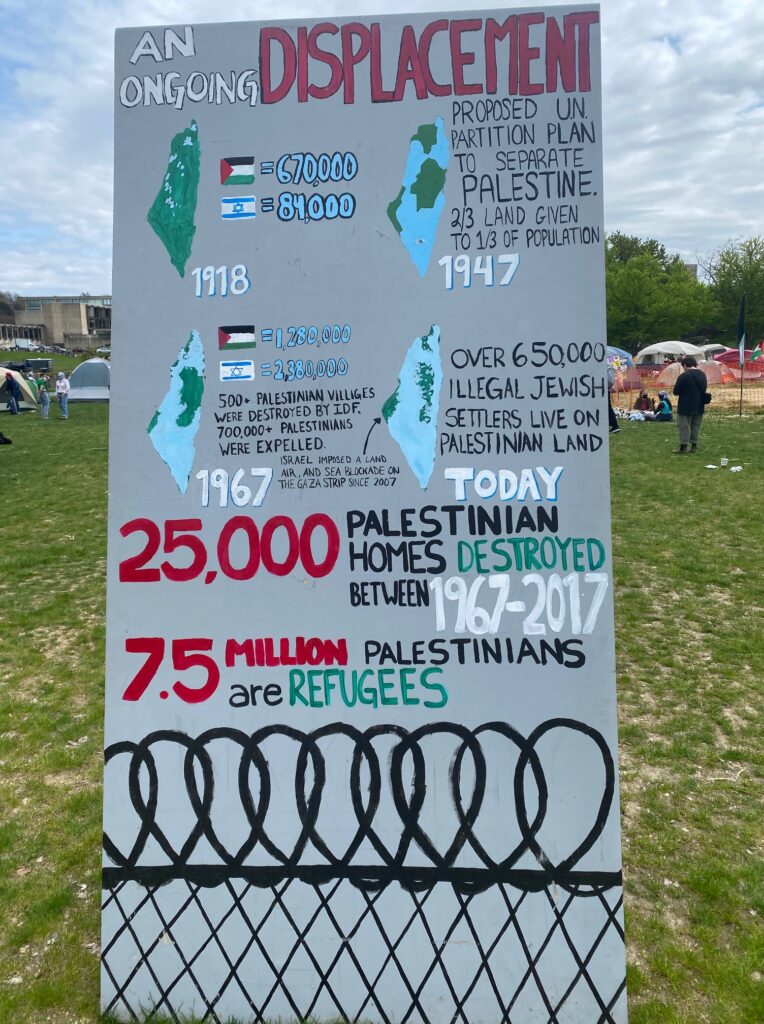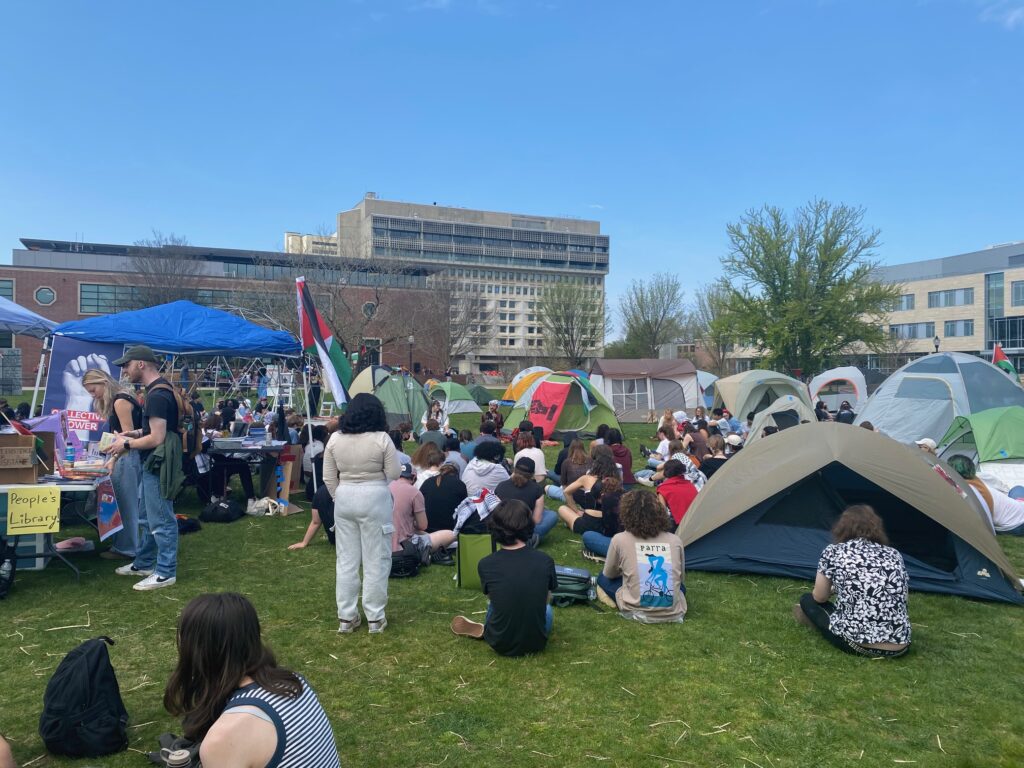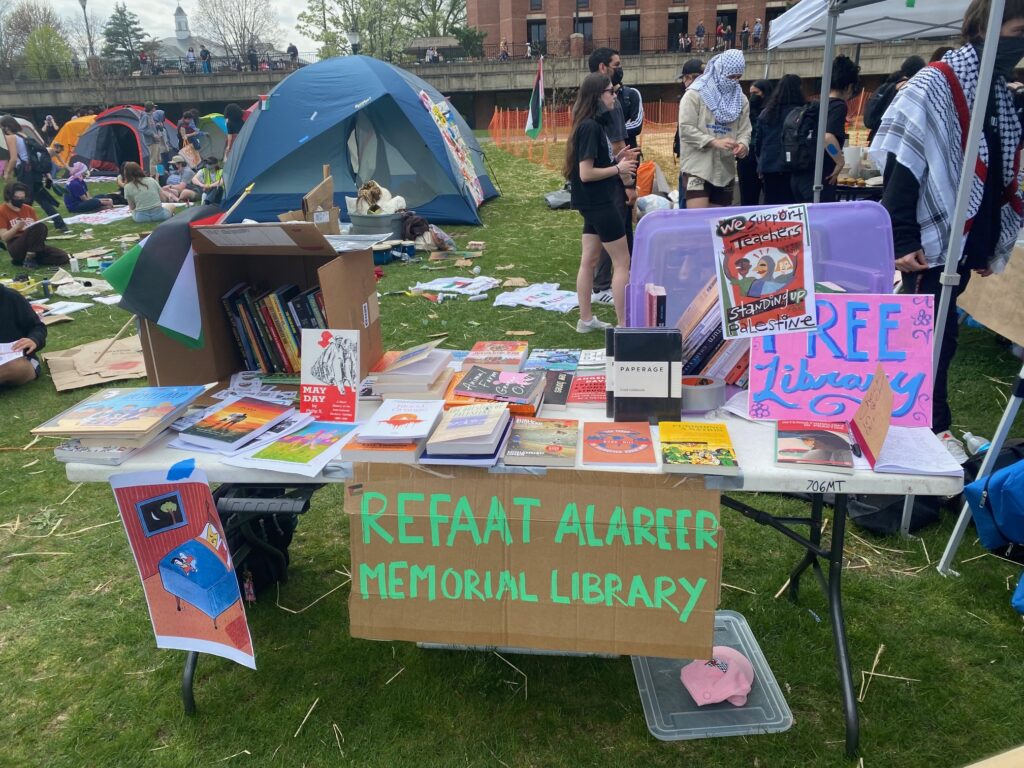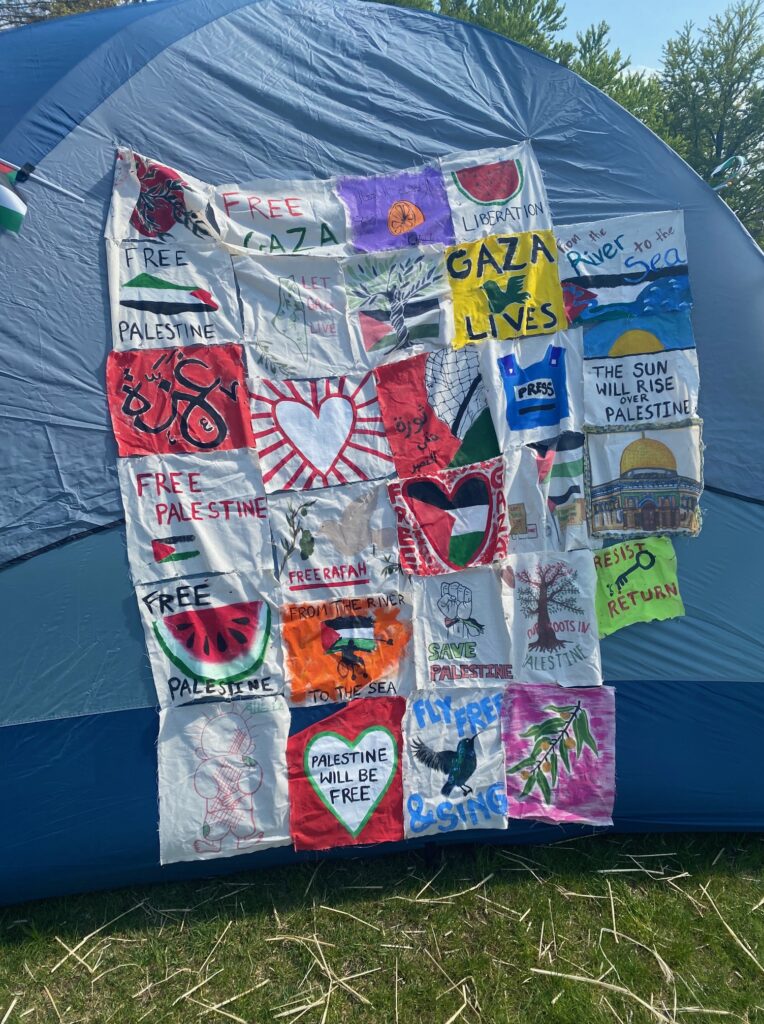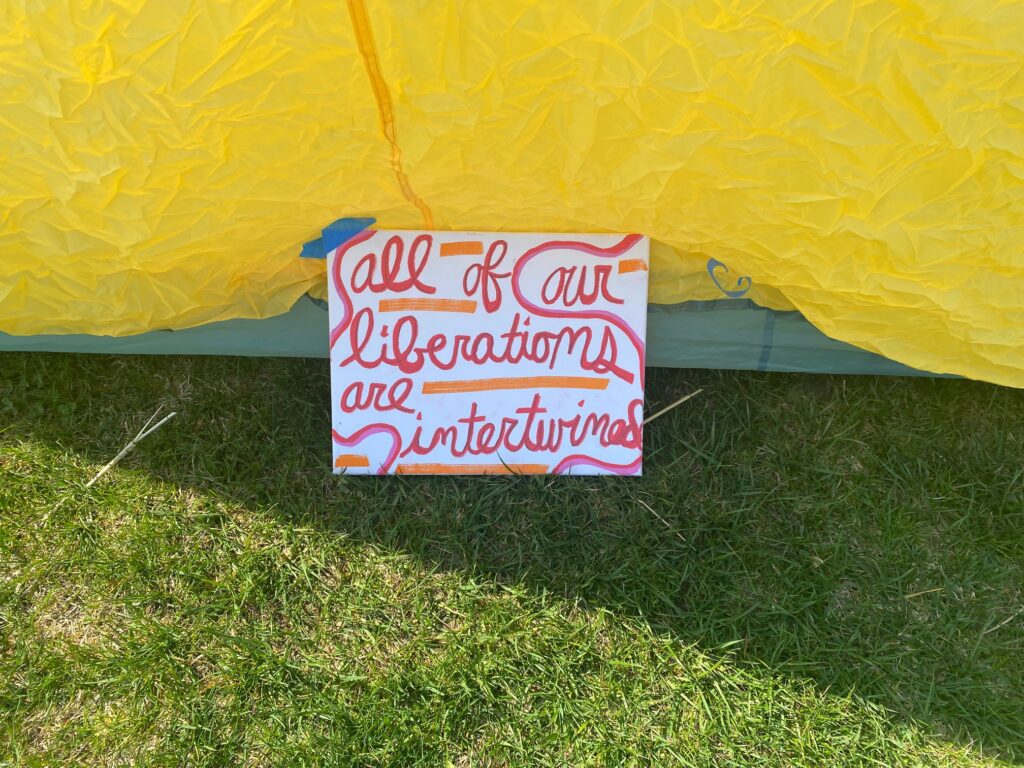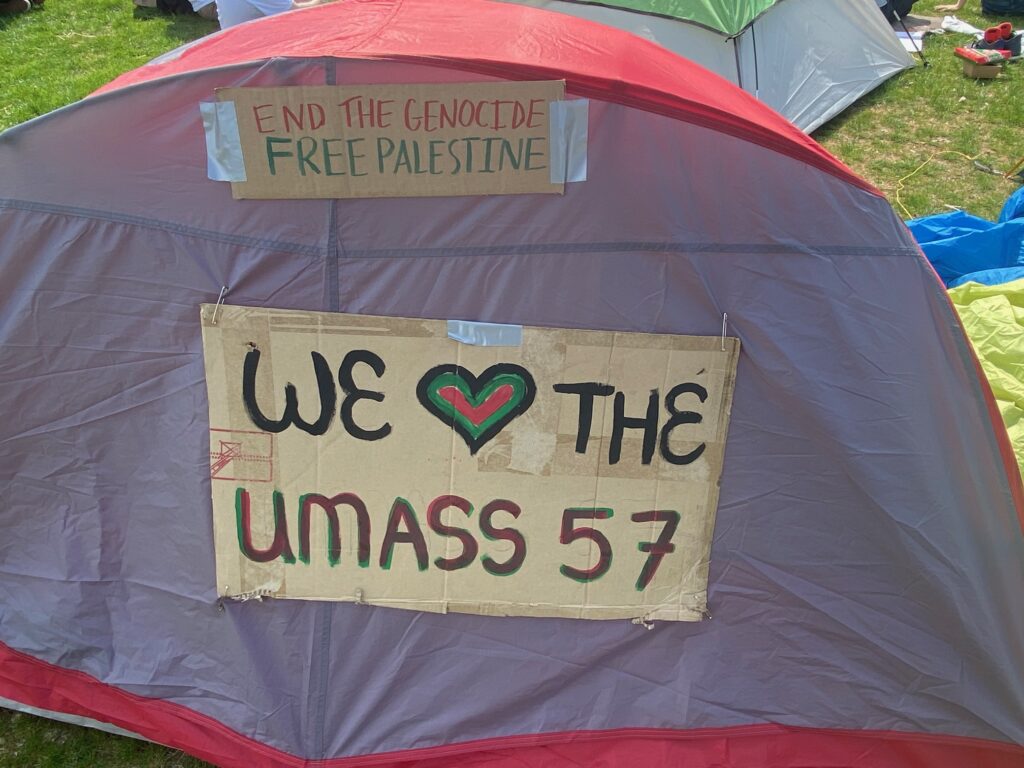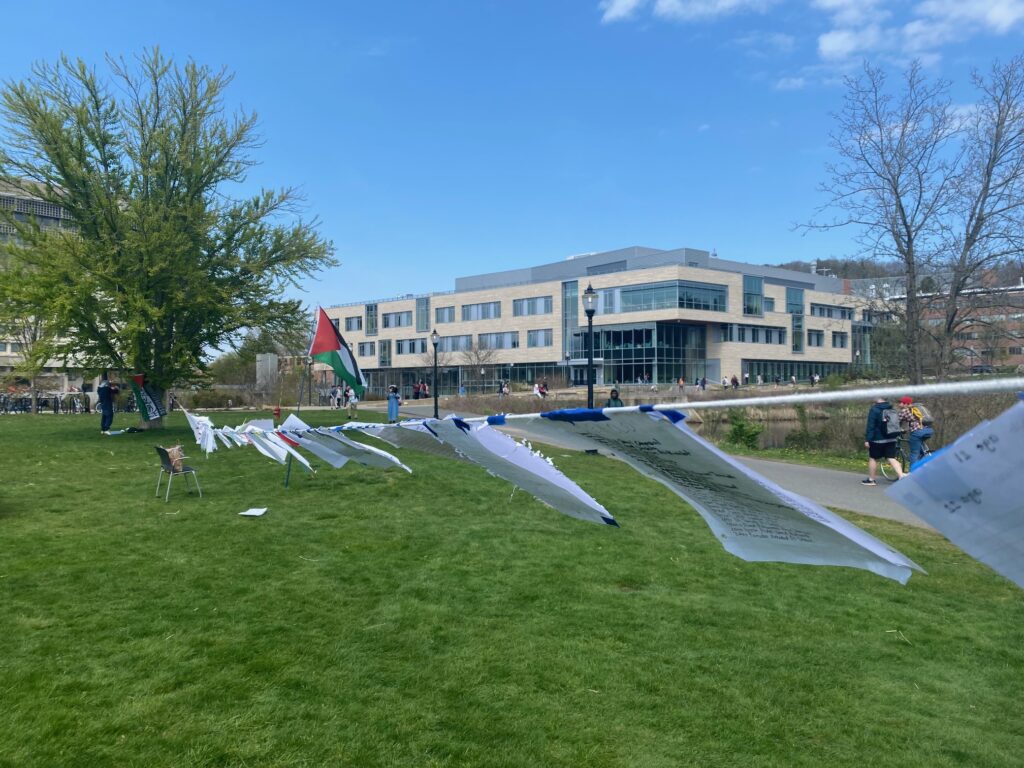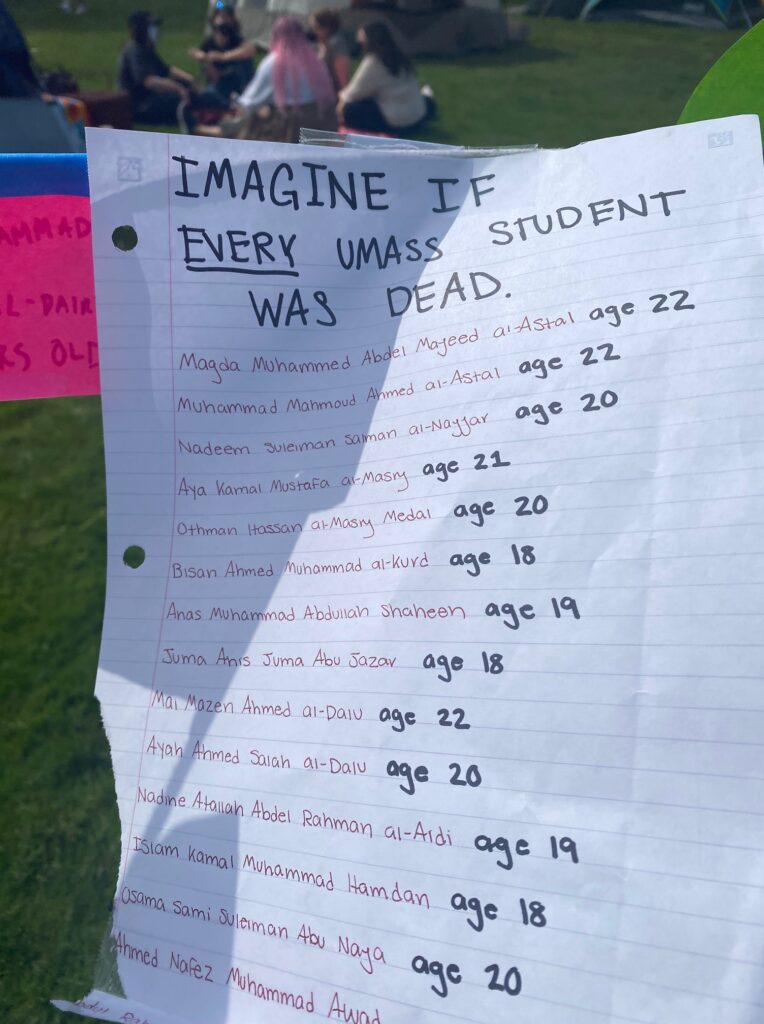UMass Students Establish Encampment in Support of Palestine
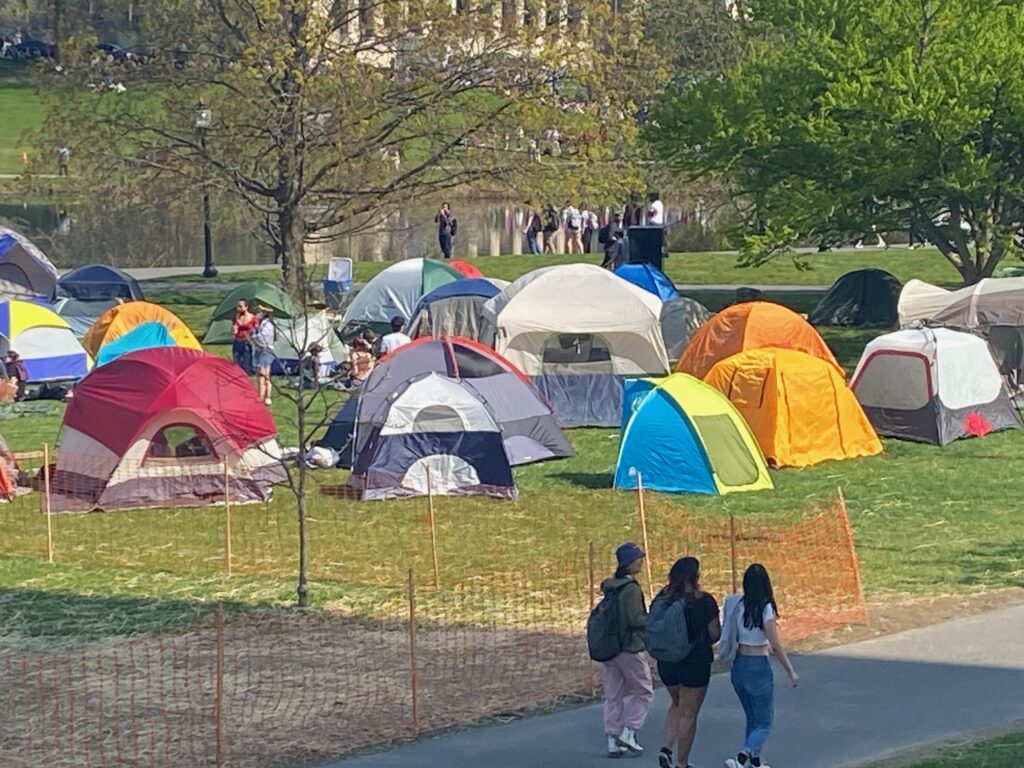
A student encampment in support of Palestine and divestment was established at UMass on April 29 and removed the following day. Photo: Art Keene
By Art and Maura Keene
Editor’s note: because of draconian punishments (see also here and here) imposed on pro-Palestinian protestors at some campuses in recent days, organizers of the UMass encampment requested that no student at the UMass encampment be identified by name and that photos be taken in a way that obscures the indentity of participating students.
A coalition of UMass students established an encampment in support of Palestine on Monday morning (4/29) on the lawn between the Dubois library and the campus pond at UMass Amherst. By early afternoon, roughly 300 students had gathered in the small settlement that included over 50 tents, a small library, first aid and supply stations, food tables, a general information table, an outdoor classroom, and a few art installations. The encampment joins a national proliferation of encampments now numbering over 100 across the U.S., Australia, Canada, France, Italy, and the UK and with new campuses joining the protests daily (see also here).
According to a member of the press team who asked to remain anonymous, the UMass encampment has been organized in solidarity with Palestinian people who oppose the ongoing genocide in Gaza and the U.S. role in supporting it. It also supports the UMass 57, a group of students who were arrested on the UMass campus last October during a protest of the war in Gaza, and demands UMass divestment from its entanglements with corporations that sustain war.
The UMass encampment is maintaining contact with other such encampments around the country that are sharing reports on their local actions and conditions. Some of these encampments have been met with violent police intervention (e.g. at Columbia, CCNY, CUNY, Emory, Emerson, the University of Texas Austin, Virginia Tech, and Utah, Washington U.), while others have proceeded largely undisturbed (e.g. Cal-Berkeley, MIT, Northwestern, Pomona, Wisconsin-Milwaukee).
On mid-Monday afternoon, there was a teach-in at the UMass tent city that appeared to have over 100 participants, with several other teach-in events scheduled for the first day and a musical performance scheduled for the first evening. Many students sat in small groups outside of their tents holding informal discussions. Many covered their faces with their PPE masks, scarves, or Keffiyeh (a traditional Arab headdress that has become synonymous with Palestinian identity) in an effort to disguise their identities following punishments imposed on pro-Palestinan students at other campuses that included arrest, suspension, and being banned from campus. At the time of our visit, a handful of counter-demonstrators appeared to be gathering on the library plaza above the encampment, but according to students at the encampment, there had been no engagement with counter-demonstrators or with university officials thus far as has been common on some other campuses.
The mood on Monday afternoon was peaceful, busy, somber, and serious. A full schedule of activities was posted at the entrance to the camp that included a people’s science fair, street medical training, discussions on housing, student debt, and endowments, poetry, and an “anti-zionist” seder. The tent city was organized and divided into zones of habitation, services, and learning/communal activity. Many tents displayed homemade signs with political messages such as “UMass Disclose and Divest” and “End the Genocide.” Our press contact told us that extensive planning had gone into creating the encampment in a way that would ensure that everyone was safe, that their needs were being met, and that things would run democratically so that everyone could determine for themselves how they wanted to participate. On hand were a medical team, safety team, legal team, police liaison team, and very busy press team.
The encampment was organized by the UMass chapter of Popular Universities for Gaza, a national organization, and also involved participation of other UMass student organizations as well as support from students from Smith and Mount Holyoke Colleges.
The organization supports the Palestinian call for three basic rights:
- The right not to live under occupation in the West Bank and Gaza Strip
- The right to equality for Palestinian citizens of Israel
- The right for Palestinian refugees to return to their homeland
Our press contact said, “While we identify with other schools protesting their school’s connection to the genocide in Gaza, we are also asking that our school divest from war profiteers such a Raytheon with which UMass has a substantial relationship and to which UMass funnels their graduates. We are calling for investments in those war profiteering companies to be replaced with investments in companies that are working toward a better future.”
Their statement also said, “Despite 75% of the student body supporting divestment from war and from Israel, our administration feels more comfortable investing in war profiteers and benefiting directly from death. We are asking that UMass instead invest in housing for its own community rather than in the destruction of Gaza. The university has more students than they have housing for and there is a severe housing crisis in the Pioneer Valley. We have been making these demands for demilitarization long before October 7. Last year there was a housing justice encampment in this same location that was allowed to proceed in peace. This year, fifty-seven students who were protesting on October 12 for demilitarization were arrested and tried in criminal court and have been sanctioned and are still on probation. The University is now being investigated for discrimination against Arab and Palestinian students.”
Students say that they have made multiple requests for a meeting with Chancellor Javier Reyes over the last several months to discuss their concerns and demands, and each request has been rebuffed.
Read More: Protestors Form Gaza Solidarity Encampment on Campus Lawn (Massachusetts Daily Collegian)
In response to the encampment, Reyes issued the following statement late Monday afternoon,
To the UMass community:
This morning, an unauthorized encampment was established on university property in violation of several campus policies, including the Land Use Policy, which requires prior approval for the utilization of university property.
This policy, along with ensuring “Activities, programs or events [do] not interfere with official University functions,” ensures that spaces on campus are made available equally and fairly. In this instance, in addition to there having been no request submitted for the use of this property by those occupying it, the space was already reserved for a university event. We were forced to cancel this event.
This encampment is in violation of university policy and those present in it have been notified multiple times and have been asked to dismantle the encampment. Those who continue to not comply will be trespassing.
In all instances, the University of Massachusetts Amherst strongly supports the rights of its students to demonstrate peacefully and exercise their protected rights to speech and assembly.
The presence of unauthorized structures, including tents, is not protected speech. Disruptive behavior is not protected speech. Activities that violate university policy or the rights of others on campus to participate in the regular business of the university are not protected speech.
The university’s policies do not bar lawful demonstrations; to the contrary, they protect the rights of the UMass community — regardless of their political views — to participate equally in the free and respectful exchange of ideas. As we have shared with the demonstrators today, full compliance with university policies, including the removal of tents and other unauthorized structures is required.
We can, and must, be able to disagree with each other and take principled stances while understanding the law and policies that govern our university.
Javier Reyes
Chancellor
A Photo Gallery of the UMass Encampment
